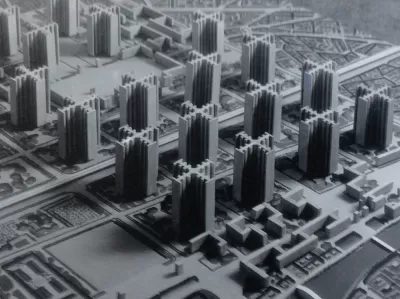Charles Wolfe calls attention to similarities between contemporary urbanism and yesterday's debunked utopias. The two may differ in substance, but both tend toward a certain level of dogma that isn't necessarily helpful on the ground.

"Like today," Charles Wolfe writes, "planning activities of a century ago sought improved residential quality, including a scheme which correlated scaled streets according to use, local stores, the community school, parks, playgrounds, open space, and social interaction among neighbors." These days, he goes on, we often criticize those principles of yesteryear for oversimplification, architectural determinism, and their lack of provisions for environmental sustainability and social equity.
But is it possible that planners of the future will see many of today's urbanist concepts in a similar light? Wolfe writes, "Absent large swaths of single-entity ownership, redevelopment of our current urban landscape is not easy — with limited raw land available for straightforward public or private sector-led development without sophisticated mitigation solutions."
In that context, "prescriptive" goals involving smart growth, placemaking, sustainability, and the like may fail to achieve their visionaries' wider aims without "reality checks against the challenges of design, equity, regulation and financing, and [the need to] be addressed at an integrated and practical level worldwide." We shouldn't be so certain, in other words, that our own utopias aren't as flawed as those of our predecessors.
FULL STORY: Overselling utopia? The urbanist’s dilemma

Maui's Vacation Rental Debate Turns Ugly
Verbal attacks, misinformation campaigns and fistfights plague a high-stakes debate to convert thousands of vacation rentals into long-term housing.

Planetizen Federal Action Tracker
A weekly monitor of how Trump’s orders and actions are impacting planners and planning in America.

In Urban Planning, AI Prompting Could be the New Design Thinking
Creativity has long been key to great urban design. What if we see AI as our new creative partner?

King County Supportive Housing Program Offers Hope for Unhoused Residents
The county is taking a ‘Housing First’ approach that prioritizes getting people into housing, then offering wraparound supportive services.

Researchers Use AI to Get Clearer Picture of US Housing
Analysts are using artificial intelligence to supercharge their research by allowing them to comb through data faster. Though these AI tools can be error prone, they save time and housing researchers are optimistic about the future.

Making Shared Micromobility More Inclusive
Cities and shared mobility system operators can do more to include people with disabilities in planning and operations, per a new report.
Urban Design for Planners 1: Software Tools
This six-course series explores essential urban design concepts using open source software and equips planners with the tools they need to participate fully in the urban design process.
Planning for Universal Design
Learn the tools for implementing Universal Design in planning regulations.
planning NEXT
Appalachian Highlands Housing Partners
Mpact (founded as Rail~Volution)
City of Camden Redevelopment Agency
City of Astoria
City of Portland
City of Laramie




























